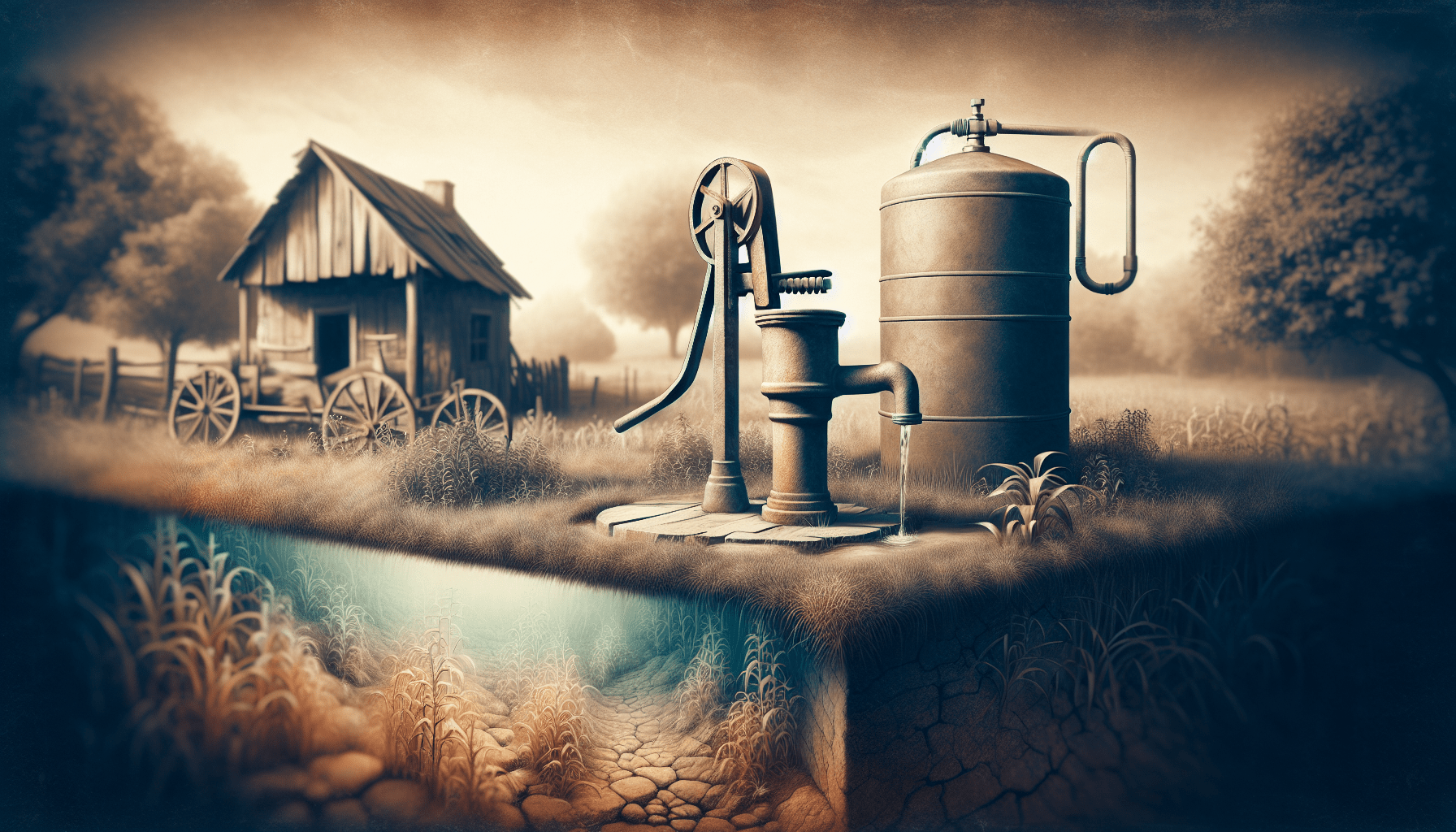In regions where well water pressure tank maintenance requirements are in place, it is important to address the safety concerns associated with well water. Ensuring the safety of well water is crucial for the health and well-being of individuals who rely on it for their daily needs. By understanding and addressing these concerns, necessary precautions can be taken to minimize any potential risks and ensure the quality of well water remains at a high standard.
Introduction
Welcome to this comprehensive article on the safety concerns and importance of well water in regions with well water pressure tank maintenance requirements. If you rely on well water for your household needs, understanding the significance of maintaining your pressure tank and the potential risks associated with well water is crucial. In this article, we will explore the importance of well water, the role of pressure tanks in well water systems, and the safety concerns related to contamination, health risks, physical hazards, and legal requirements. By gaining insight into these topics, you can ensure the safety and well-being of your family and make informed decisions regarding your well water system.
Importance of Well Water
Understanding Well Water
Well water refers to water sourced from underground aquifers through a drilled well. This groundwater, obtained from natural reservoirs beneath the Earth’s surface, is often a valuable resource for millions of households worldwide. Understanding the characteristics of well water, such as its unique composition and potential benefits, can help you appreciate its importance.
Benefits of Using Well Water
Well water offers numerous advantages. It is often free from harmful chemicals, such as chlorine, that are commonly found in municipal water supplies. Additionally, well water is typically high in minerals, providing potential health benefits. The natural filtration process of groundwater can result in a purer water source compared to other alternatives. Furthermore, using well water can help reduce reliance on municipal water systems, contributing positively to environmental sustainability.
Rising Popularity of Well Water Systems
In recent years, the popularity of well water systems has been on the rise. Many homeowners recognize the advantages of having direct access to their water supply and greater control over its quality. Well water systems have become a popular choice for those seeking self-sufficiency and independence from public water utilities.

Pressure Tanks and Well Water Systems
What is a Well Water Pressure Tank?
A well water pressure tank is a critical component of a well water system. It is a storage reservoir that ensures a steady and consistent water supply by maintaining constant water pressure throughout your home. This tank holds a reserve of water that can be utilized when water demand exceeds the well pump’s capacity. Understanding the role of pressure tanks is essential for grasping their significance in ensuring a reliable water supply.
Role of Pressure Tanks in Well Water Systems
Pressure tanks play a vital role in maintaining proper water pressure throughout your household. When water is drawn from a faucet, shower, or appliance, the pressure tank supplies the water by using compressed air to push the water out. This eliminates the need for the well pump to turn on and off frequently, reducing wear and tear on the pump while providing consistent water pressure.
Importance of Pressure Tank Maintenance
Regular maintenance of your pressure tank is crucial for its optimal performance and longevity. Neglecting maintenance can lead to a range of issues, such as decreased water pressure, pump cycling, and even tank failures. By conducting routine maintenance, you can identify and address potential problems before they escalate, ensuring the safe and efficient operation of your well water system.
Common Maintenance Requirements for Pressure Tanks
Maintenance requirements for pressure tanks include checking the air pressure, inspecting the tank for any signs of damage or leaks, and ensuring proper insulation. It is advisable to consult the manufacturer’s guidelines or seek professional assistance to establish a maintenance routine tailored to your specific pressure tank model. Regular maintenance not only enhances the lifespan of your pressure tank but also helps prevent safety concerns that may arise from neglect or malfunction.
Safety Concerns for Well Water
Contamination Risks
One of the primary safety concerns related to well water is the risk of contamination. Well water can be exposed to various sources of contamination, including chemical pollutants, microbial pathogens, and even natural elements such as heavy metals or minerals. Understanding the potential sources of contamination and implementing preventive measures can help safeguard your well water quality.
Health Risks
The presence of contaminants in well water poses potential health risks to individuals who consume or come into contact with it. Bacterial infections, parasitic infections, and chemical exposure are among the health risks associated with contaminated well water. It is crucial to be aware of these risks and take appropriate measures to mitigate them effectively.
Physical Hazards
While not as commonly discussed, physical hazards related to well water systems and pressure tanks do exist. Pressure tank failures, explosions or bursting, scalding or burns, and mechanical malfunctions are potential physical hazards that can occur if pressure tanks are not properly maintained or if their integrity is compromised. Being aware of these hazards is essential for promoting a safe household environment.
Legal Requirements and Regulations
Compliance with local health department regulations, water quality testing requirements, water treatment standards, and reporting obligations is a crucial aspect of ensuring the safety of well water systems. Understanding the legal requirements and regulations applicable to your region can help you maintain a safe and compliant well water system.

Contamination Risks
Groundwater Contamination
Groundwater contamination can occur due to various factors, such as improper waste disposal methods, chemical spills, or agricultural practices. Contaminants can infiltrate the ground and make their way into the aquifers that supply well water. Monitoring potential sources of groundwater contamination and implementing effective preventive measures is essential in safeguarding your well water from contamination.
Microbial Contamination
Microbial contamination refers to the presence of bacteria, viruses, or parasites in well water. These microorganisms can cause illness and pose significant health risks to individuals consuming or using the contaminated water. Regular testing, proper well maintenance, and appropriate water treatment methods are vital in minimizing the risks associated with microbial contamination.
Chemical Contamination
Chemical contamination can result from various sources, such as industrial activities, agricultural runoff, or improper use of household chemicals. Exposure to harmful chemicals through contaminated well water can have detrimental effects on human health. Implementing appropriate measures to reduce chemical contamination and regular water testing can help ensure the safety of your well water.
Preventing Contamination in Well Water
Preventing contamination in well water requires a combination of proactive measures. Regular testing, proper well construction and maintenance, avoiding potential contamination sources, and implementing appropriate water treatment methods are essential in safeguarding your well water supply. It is advisable to consult with experts or professionals in the field to develop a comprehensive contamination prevention plan tailored to your specific situation.
Health Risks
Bacterial Infections
Well water contaminated with harmful bacteria can lead to bacterial infections. These infections can manifest in various forms, such as gastrointestinal illnesses, skin infections, or respiratory issues. Proper well maintenance, regular water testing, and the use of appropriate disinfection methods can significantly reduce the risk of bacterial infections associated with well water consumption.
Parasitic Infections
Certain parasites, such as Cryptosporidium and Giardia, can contaminate well water and cause parasitic infections in humans. These infections can result in severe gastrointestinal symptoms and discomfort. Following recommended water treatment protocols and ensuring proper well maintenance can help eliminate or reduce the risk of parasitic infections.
Chemical Exposure
Exposure to chemicals present in contaminated well water can have adverse health effects. Certain chemicals, such as lead, arsenic, or pesticides, can enter the groundwater and contaminate well water supplies. Regular water testing, appropriate filtration or treatment methods, and being mindful of potential chemical sources near your well can help reduce the risk of chemical exposure.
Waterborne Diseases
Waterborne diseases are a significant concern associated with well water consumption. Contaminants such as bacteria, viruses, and parasites can cause diseases like cholera, dysentery, or hepatitis. Adhering to recommended water treatment practices, proper well maintenance, and regular testing are key in preventing waterborne diseases and ensuring the safety of your well water.

Physical Hazards
Pressure Tank Failures
Pressure tank failures can occur if the tank is not properly maintained or if its structural integrity is compromised. These failures can result in water leaks, loss of water pressure, and potential damage to other components of the well water system. Regular inspections and maintenance of pressure tanks are necessary to detect and address any issues that may lead to failures.
Explosions or Bursting
In rare instances, pressure tanks can experience a buildup of excessive pressure, leading to explosions or bursting. These incidents can cause property damage and pose a significant safety risk to individuals in the vicinity. Proper pressure tank maintenance, including checking for signs of abnormal pressure buildup and addressing any potential issues promptly, is crucial in preventing such hazardous situations.
Scalding or Burns
Due to the temperature regulation mechanism in well water systems, overheating can occur if pressure tanks malfunction or if the temperature valve fails. This can lead to scalding hot water flowing out of faucets or showerheads, causing burns or scalding injuries. Regular inspection and maintenance of pressure tanks, along with the installation of appropriate temperature controls, can help prevent such accidents.
Mechanical Malfunctions
Well water systems rely on various mechanical components, including pressure switches, valves, and pumps. Malfunctions in these components can disrupt the proper functioning of the system, leading to issues such as inconsistent water pressure or complete water loss. Regular maintenance, timely repairs, and periodic checks of mechanical components are essential in preventing mechanical malfunctions that can compromise the safety and efficiency of your well water system.
Legal Requirements and Regulations
Local Health Department Regulations
Local health department regulations play a vital role in ensuring the safety and compliance of well water systems. These regulations often cover aspects such as well construction, water quality testing, and maintenance requirements. Familiarizing yourself with the specific regulations applicable to your region and following them diligently can help ensure that your well water system meets the necessary standards and regulations.
Water Quality Testing
Water quality testing is an essential aspect of maintaining a safe well water supply. Regular testing can identify potential contaminants and provide valuable insight into the overall quality of your well water. Testing for pathogens, chemicals, and other potential contaminants should be conducted at appropriate intervals to detect any changes or deviations from acceptable levels.
Water Treatment Standards
Water treatment standards provide guidelines for the acceptable levels of various contaminants in well water. Adhering to these standards ensures that your well water is safe for consumption and use. Depending on the specific contaminants present in your well water, implementing appropriate treatment methods, such as filtration or disinfection, can help meet these standards and ensure the safety of your water supply.
Reporting and Compliance
Monitoring and reporting requirements may vary depending on your jurisdiction. It is essential to familiarize yourself with your local reporting obligations and compliance procedures. Prompt reporting of any potential contamination incidents or other issues ensures that appropriate action can be taken promptly, protecting both your household’s safety and the broader community’s well-being.

Signs of Potential Issues
Discolored or Foul-Smelling Water
Discolored water, such as brown or yellowish hues, or the presence of a foul smell, can indicate potential issues with your well water. These signs may suggest contamination or problems with your well or pressure tank. Immediate investigation and appropriate corrective measures, such as water testing or well maintenance, are necessary when encountering discolored or foul-smelling water.
Low Water Pressure
Experiencing consistently low water pressure throughout your household may indicate an issue with your pressure tank or well pump. Malfunctioning or inadequate pressure tanks can lead to inadequate water pressure, affecting your daily water usage needs. Regular inspections and maintenance of your pressure tank and well pump can help identify and rectify any issues causing low water pressure.
Frequent Pump Cycling
Frequent cycling of the well pump, where it turns on and off repeatedly even without significant water demand, can indicate a problem with your pressure tank. Issues such as waterlogged tanks or incorrect air pressure levels can cause frequent pump cycling. Prompt attention and adjustment of the pressure tank, or seeking professional assistance, can prevent further damage to your well water system.
Air or Water Leaks
Leakage of air or water from your pressure tank or well system components can indicate structural issues or defects. Leaks can result in inefficient operation, decreased water pressure, or potential system failure. Identifying and addressing leaks promptly, either through self-inspection or professional assistance, is crucial in preventing safety hazards and ensuring the reliability of your well water system.
Conclusion
In regions where well water pressure tank maintenance requirements exist, it is vital to understand and address the safety concerns related to well water. From the risks of contamination, health hazards, and physical dangers to the importance of complying with legal requirements, being well-informed is the key to a safe and reliable well water system. By recognizing the significance of pressure tanks in maintaining water pressure, understanding potential contamination risks, and properly maintaining your well water system, you can ensure the well-being of your family and enjoy the benefits of a clean and sustainable water source. Stay proactive, stay informed, and safeguard your well water supply for a healthy and worry-free lifestyle.

